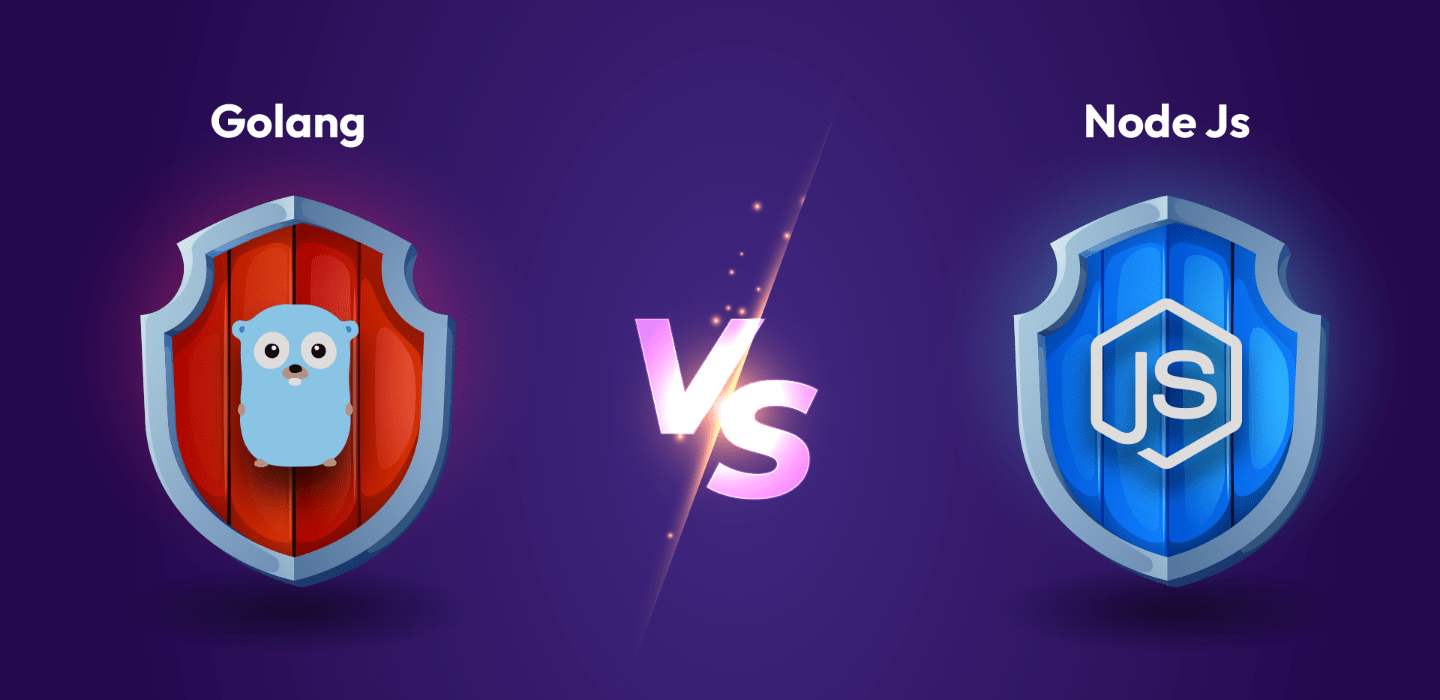| Parameters | Golang | Rust |
|---|---|---|
| Performance | Fast | Faster |
| Speed | Needs Less Time | Needs More Time |
| Popularity | More Popular | Less Popular |
| Learning Curve | Easy | Complex |
| Code Maintainability | Easy to Maintain Large Codebase | Less smooth Code Maintainability | Concurrency | In-built | Lacks Concurrency |
| Security | Less Secure | Secure |
| Community | Better | Good |
| Memory Management | Handles Memory Automatically | Program cannot be compiled not Memory Safe |
| Libraries | Good | Good |
| Complexity | Simple | Complex |
| Functionality | Fewer Features | Many Features and Functionalities |
Quick Summary:
The rapidly evolving software development marketplace and technological trends have radically shifted the paradigms of business needs and demands. To meet up to the fast-paced marketplace, businesses often strive to make informed decisions and achieve optimal results when choosing a tech stack for their web application development. However, the two programming languages that have hooked the attention of tech enthusiasts and business owners this time are Golang vs Rust. Therefore, this blog post will provide you with around-the-corner information and updates to help you gain significant knowledge and choose between Golang or Rust as the ideal option for your next web application development project.
Table of Contents
Golang vs Rust Overview
Rust and Golang are the two open-source, popular, and performant languages that are widely adopted and offer excellent performance. However, certain aspects of both the programming languages Rust and Golang make one different from the other. On the one hand, the Go programming language strongly focuses on building web APIs and small services with scalability metrics via Goroutines. On the other hand, Rust is a high-level language efficient in processing large amounts of data and other CPU-intensive operations, such as executing algorithms. The most significant advantage of Rust over Golang is that it is more efficient for high-performant applications.
This is the circumferential overview of the difference between the two. However, before jumping onto the detailed comparison between Golang and Rust, let us first brush up on our knowledge of the two programming languages.
What is Golang?
Golang or Go programming language was developed and designed by Robert Griesemer, Rob Pike, and Ken Thompson at Google to carry away the excess baggage found in languages such as C++ and enhance the coding experiences while addressing the dislikes and inadequacies of other languages. Golang is statically typed and syntactically similar to C language. It is intentionally designed for simplicity for developers. It supports tooling to offer external packages, which can be published using a set of commands and has a robust set of standard libraries.
The platform-independent nature of Golang makes it similar to JAVA, and its codes can be compiled and applied to any server application. Also, it avoids problems faced by other dynamically typed languages by being statically typed, ensuring type conversions and compatibility. Golang also allows for parallel code writing, making it easy and convenient to understand your tests. It is an excellent choice for building efficient web applications due to its simplicity, reliability, and efficiency.
The Mantra of Go is: Solve Real Problems Today.
Our today’s age go programmers have the right skills and experience that can implement your goals. Hire Golang Developer as per your need!
Let us take a glimpse at a few Advantages and Disadvantages of Golang:
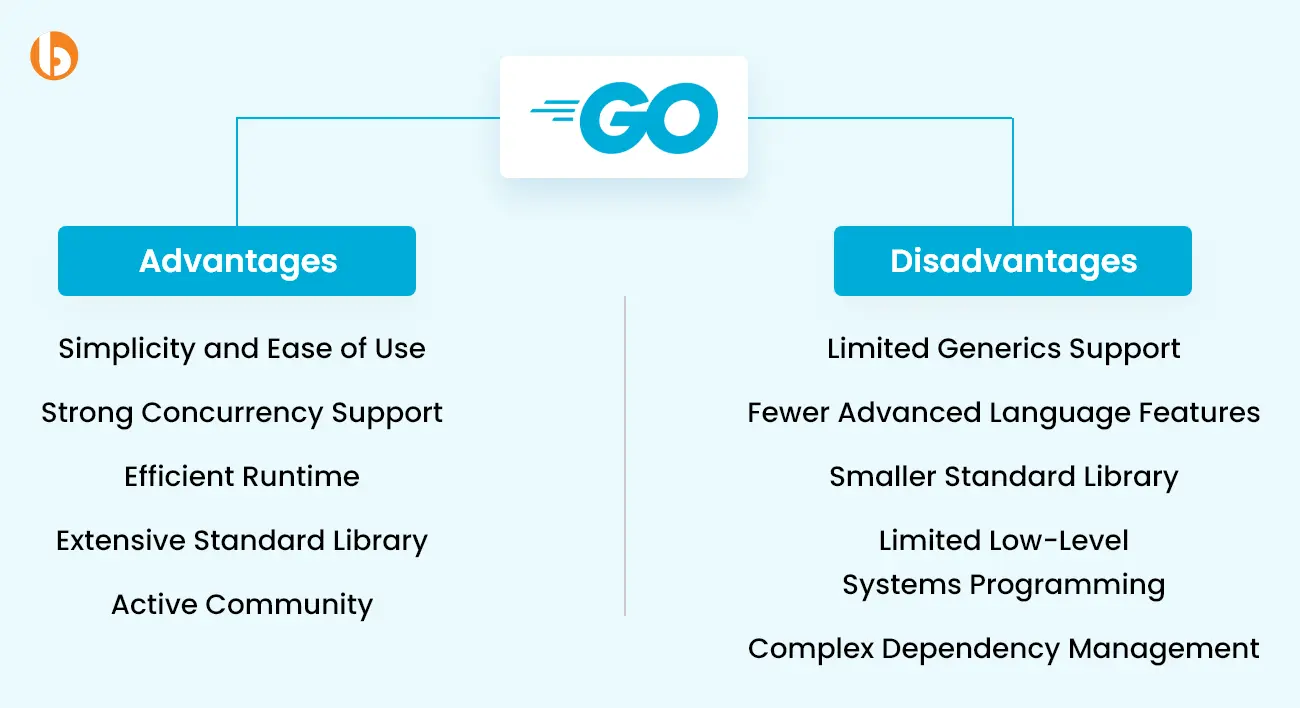
What is Rust?
Rust is a multi-paradigm, general-purpose, high-level programming language introduced by Graydon Hoare and Dave Herman, Brendan Eich, and others at Mozilla Research in 2015. The Rust language focuses on safety and concurrency. It is designed to maintain and preserve the integrity of large systems and emphasizes control of memory layout, concurrency, and comparable idiomatic performance to C++. Rust is fast and memory-efficient in nature, making it suitable for embedded services and easy integration with other languages. It is also effective for performance-critical services since it has no runtime or garbage collector.
Furthermore, Rust is a reliable compiler that eliminates bugs during compilation. It provides top-notch tooling ability, smart multi-editor support with auto-completion, and type inspections such as auto-formatting, making it a user-friendly compiler. Rust is an excellent platform for documentation and has a friendly compiler with useful error messages.
Considering a few Advantages and Disadvantages of Rust programming language are as follows:
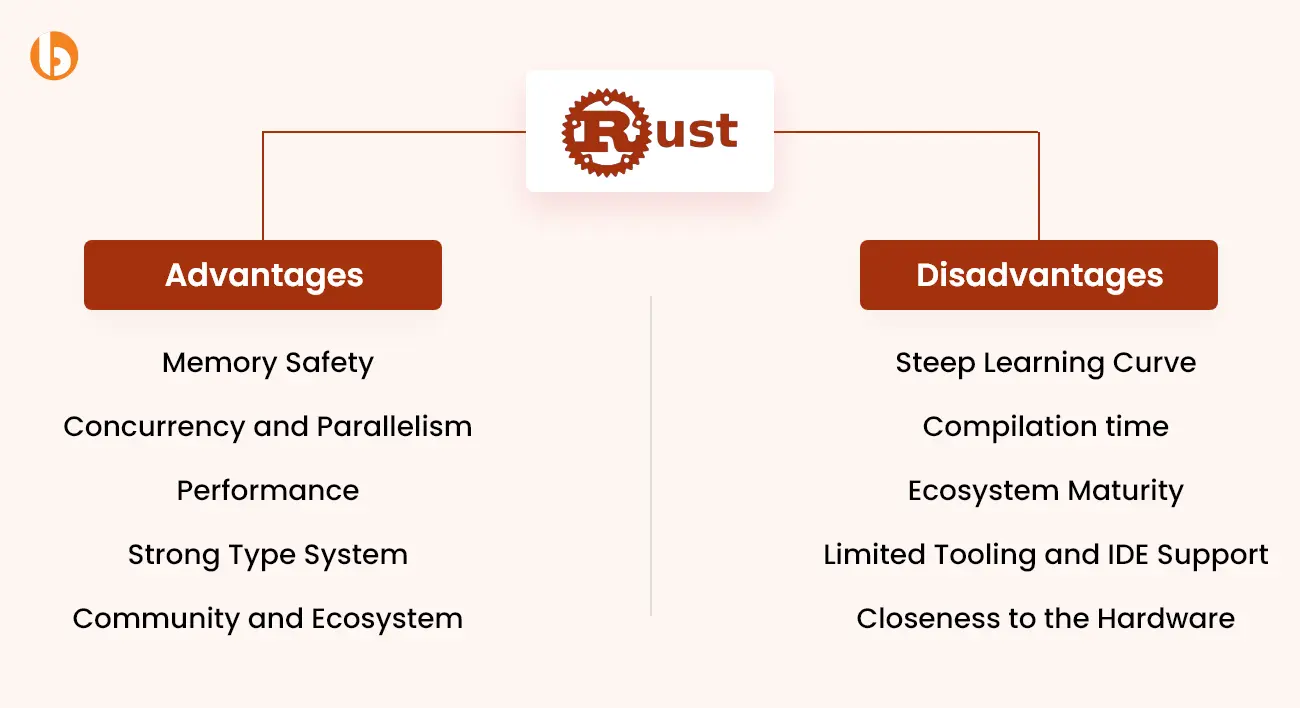
Rust and Golang Similarities
Rust is an open-source low-level, statistically typed multi-paradigm language focused on safety and performance. Golang is an open-source programming language that makes building simple, reliable, and efficient software easy. Though both the programming languages share some significant differences but are similar to each other under many heads, which is also why Golang and Rust are often heard together. Let us have a look at a few such similarities ourselves.
Memory Safety
Golang and Rust are modern languages prioritize memory safety and possess mechanisms that prevent common memory-related bugs such as NULL pointer dereference buffer overflows and memory leaks. However, both handle the problems differently but aim to be more innovative and safer than other languages when dealing with memory safety bugs, managing memory, and helping you write correct and performant codes.
General Purpose Languages
Both Golang and Rust are general-purpose programming languages that are powerful and scalable, enabling you to develop various modern applications, including web applications, distributed microservices, or embedded microcontrollers for mobile applications. They possess an excellent set of standard libraries, an exceptional third-party ecosystem, and significant community support; both prevent choice among the developer community.
Fast and Compiled
Golang and Rust are both compiled languages focused on producing efficient code meaning the programs are directly translated into the executable machine code, enabling you to deploy your programs as a single binary file; unlike interpreted languages, you are not required to distribute an interpreter, numerous libraries and dependencies along with your code which is an add-on benefit, this in turn, makes both Rust and Go extremely fast compared to the other interpreted languages.
Pragmatic Programming
Generally, the other languages are all made for a specific purpose whereby they are considering Golang and Rust both have their features more inclined towards functional and OOP or object-oriented programming; they are pragmatic and intended to solve problems most efficiently and appropriately instead of binding the solutions in a particular specified method of doing it. Also, for those more inclined towards the functional programming style, many features in the Rust language give it a minor advantage over the Go language.
Golang vs Rust Comparison Table
Before we jump onto the in-depth comparison between Rust vs Go, let us first look at the tabular representation of the comparison between the two:
Rust vs Go Detailed Comparison
As we have discussed before, Golang and Rust are both performant languages designed to scale. This raises the question of what is the need to compare Golang vs Rust when both are performant and aptly suitable for numerous web application development projects.
Well! This discussion arises because of their launch time; Golang’s version 1.0 was released in March 2012, whereas Rust first appeared in May 2015, which brings us to the fact that there is not much difference between the age of both languages. Thus, both are open-source, almost equal in age, performant, can handle high-volume traffic, and handle memory safety bugs.
To better understand the difference between the two, let us compare the two programming languages on various comparison metrics to help you get a better insight into choosing the right programming languages for your next web application development project.
Performance
As we have discussed, the Go language was introduced as an alternative to the traditional C++ language and was easier to learn and code. Golang was also optimized to run on multicore CPUs. The most significant advantage of Golang is the concurrency it offers. Also, it offers Goroutines that enable you to run functions as subprocesses. You can easily use Goroutines by simply adding the go syntax to a function to make it a subprocess. The go language concurrency feature enables you to deploy workloads across multiple CPU cores, making it a very efficient language.
However, Rust is a high-performant and highly significant language compared to the traditional highest-performing compiled programming languages like C and C++. Also, it offers memory safety and concurrency with almost no effect on execution. Also, Rust enables you to create all these complex abstractions without affecting the runtime. Rust shows this much performance because Rust programs are more inclined towards the machine’s performance, making it ideally fit for applications that require speed of execution above everything else that requires doing other CPU intensive operations, such as game programming, web browser components, operating system kernels, and real-time control systems.
Are you convinced of opting Golang over Rust for your next enterprise project?
Hire the best Golang Development Company and leverage the perks of this modern charismatic programming language.
Performance Benchmarks
Talking about the Rust vs Go performance benchmarks. It is generally not a clear metric to compare the two on various aspects of performance. However, let us look at the Benchmarks Game, which compares the two based on multiple programs for each language and compares how long they take to run or memory usage or code complexity to understand the difference between languages better.
With the below results, we can see that the most optimized Rust language code results are far faster than the most optimized codes of Golang.
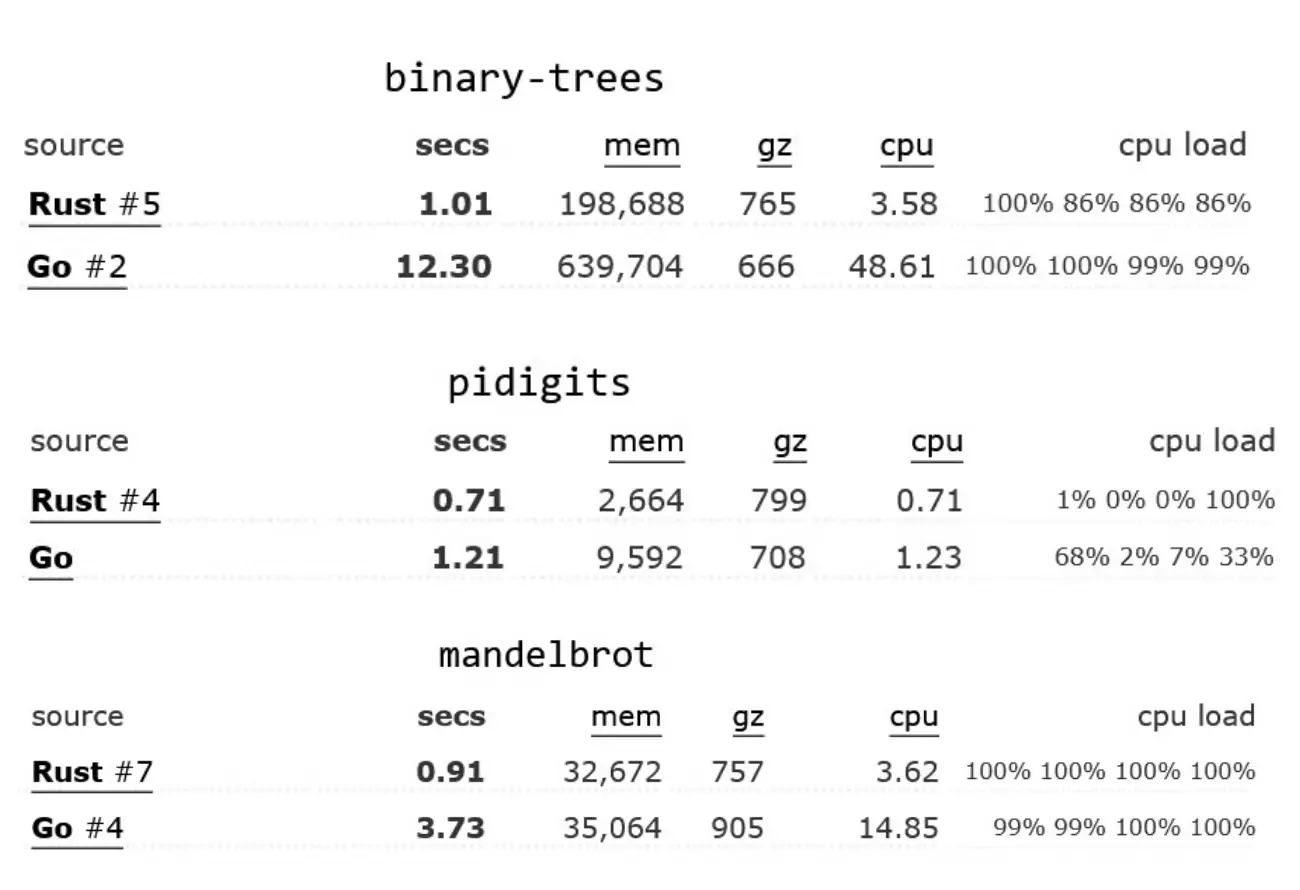
Concurrency
Most programming languages have some form of concurrent programming, but the Go language is specially designed to use CPUs efficiently and handle multiple tasks simultaneously. You can achieve concurrency in Golang by using the Goroutines, which are lightweight, call fewer resources, and are executed independently, allowing Golang to work with more goroutines without hampering the performance. Thus, they can run concurrently with other functions, eliminating the need to create new threads.
Rust, on the other hand, is a bit new to the name of concurrency but is rapidly growing with a different approach of threads that enable it to run tasks concurrently, thus offering more strict and explicit memory management and synchronization as it uses ownership and borrowing rules to ensure thread safety.
Memory Management
Rust and Golang possess security and memory management, which makes them ideal for cloud computing. Golang offers several paradigms, such as memory allocation and automatic garbage collection, to handle possible vulnerabilities and bugs. During runtime, the Go language gets automated at runtime and frees the developers from the hustle of assigning or removing the memory.
Rust, on the other hand, ensures no memory leakage during compile time. Also, the code won’t be compiled until it is memory safe, preventing issues like null pointer references and memory leaks; thus, developers need more explicit memory management to be attentive and aware of the memory allocation, leading to a more complex learning curve.
Popularity
Though popularity is often considered a general metric to determine which language is better, talking about the Go vs Rust Popularity, Golang, though comparatively new within the market, has gained immense popularity; at the same time, Rust has also seen a significant surge in popularity metrics in recent years.
According to TIOBE Index, measuring the popularity of these languages based on search engine data, Golang holds 14th rank as of February 2024, while Rust is also gaining pace with 24th position in February 2024.
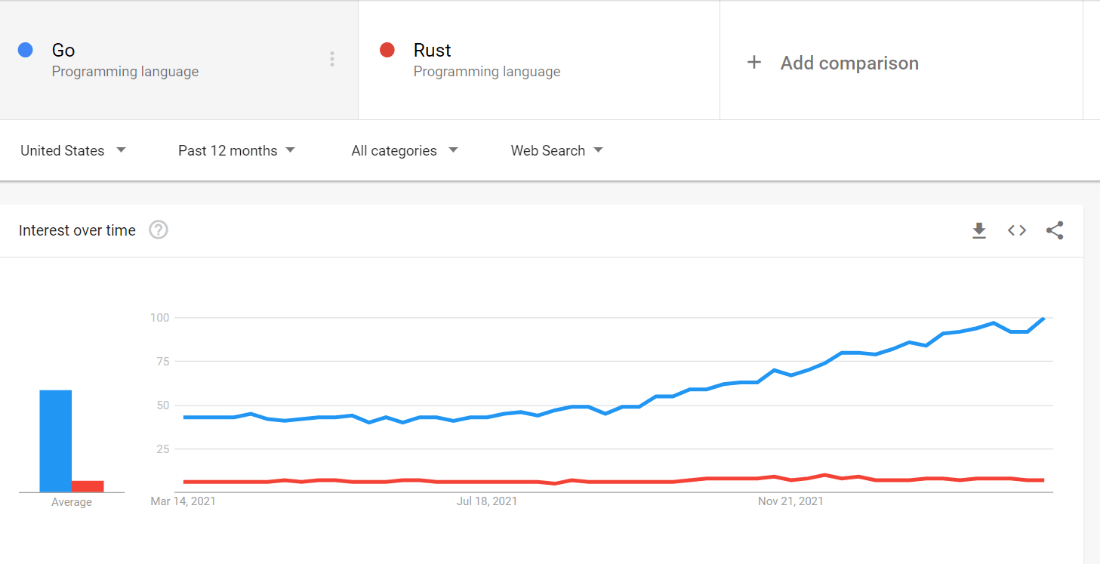
According to Google Trends, the Go language is far above the Rust language. Though Rust has taken up pace in recent years, it has a long way to travel to match the popularity of Golang and would need to run faster to match the popularity of Golang.
Development Speed
Considering the Go vs Rust Development Speed into the ambit, it is agreeable that it depends on the type of the project and the experience of the developer working on the project, which again is a question of preference where some developers can write code faster in Golang however, others find the safety of Rust is more appealing to speed up the development by reducing the debugging and troubleshooting hustles.
However, for Development Speed, Golang is a better choice for faster delivery and effective development. Rust is also a viable option if extensive safety and reliability are prioritized.
Learning Curve
How steeper learning curve Golang and Rust has depends on the developers and their experience. At first instance, Golang shows a simple learning curve which makes it simple for developers, along with the extensive standard library, which aids in simplification of the development process. Also, the syntax of Golang is concise, along with the robust documentation, making it even more simple to learn.
However, Rust keeps a more complex learning curve, and the new developers would need some time to get familiar with the detailed knowledge of Rust. It has a syntax almost similar to that of C++, making it comparatively for developers familiar with C++, but still, in comparison to Golang, Rust has a steeper learning curve.
Community Support
Golang and Rust 2024 have active and growing communities that support developers. Golang, being backed by Google, has a larger community and ecosystem. It has a vast library of resources and documentation available, making it easier for developers to find solutions to problems. Golang also has a dedicated team of developers that maintain the language and its ecosystem. Moreover, Golang has been around longer than Rust, so it has a more extensive user base.
On the other hand, Rust has a passionate and dedicated community that is growing rapidly. Despite being a newer language, Rust has gained much traction and is widely adopted in various industries. The Rust community is known for its inclusivity and supportive nature, making it an excellent place for beginners to learn and grow. Rust also strongly focuses on safety and security, attracting many developers who want to work on mission-critical projects.
Both communities have active forums, chat rooms, and social media groups, making it easier for developers to connect and seek help. Additionally, both languages have a significant presence on GitHub, with many open-source projects for developers to contribute to and learn from.
Scalability
Scalability is not an issue with Golang or Rust; Golang, on the one hand, is renowned for its simplicity and uniformity, making it easy to develop and maintain large-scale applications compared to Golang.
On the other hand, Rust is mainly performance and safety centric, which is essential for building large-scale applications. So, again we can infer that both Rust and Golang possess a similar level of scalability.
Security
Security has one of the strong suits of Rust; still, Golang is not behind Rust in any sense; however, Rust prevents common security vulnerabilities such as buffer overflows and use after free errors. Also, it allows for writing code that is safe and efficient. However, the Go language has high-level inbuilt features for secure coding to write safe and performant codes.
Error Handling
Golang’s error handling is simple and easy to use. Rust possesses ‘Result’ type offers, allowing for more robust error handling. At the same time, Rust, on the other hand, has a more complex error handling that requires more effort to learn, and using ‘panic!’ must be avoided when possible. So, Golang here has the upper hand over Rust when it comes to Error Handling.
Tooling
Golang and Rust have a strong and vibrant tooling ecosystem that allows developers to build and maintain high-quality applications. However, Golang’s toolchain is simple and consistent and features tools like go, gofmt, and go vet, while Rust’s toolchain is more complex. Still, it focuses on safety and reliability, including Cargo and a powerful macro system. Also, both languages are popular among product owners, offering game development engines with Golang’s simple and Rust’s more advanced tools.
Golang vs Rust: Use Cases
Golang and Rust are both versatile languages with a wide range of use cases. On one hand, Golang is ideal for building web applications, distributed systems, system level programming and security-critical applications. Golang offers frameworks like Gin and Echo along with Command-Line INterfaces with libraries like Cobra which collectively make it well-suited for building networking and distributed systems due to its strong support for concurrency and ability to handle extensive connections.
Rust, on the other hand, is often well-suited for system-level programming, such as building operating systems, device drivers, and other low-level softwares. Rust emphasizes safety and reliability, making it a great choice for security-critical applications like encryption and authentication systems. Rust possesses efficient frameworks like Rocket and Actix along with additional game development engines like Amethyst.
Types of Applications You Can Build Using Golang and Rust
Rust and Golang are efficient and capable enough to build a wide range of applications; both have their strengths and are best suited for their specific projects. Below are a few applications you can build using Golang vs Rust.
Applications you can build using Golang:
- Web Servers and Microservices
- RESRful APIs
- Command-Line Interfaces
- Real-Time Chat Applications
- Networking Tools
- Data Processing and ETL
- Distributed Systems
Applications you can build using Rust:
- Networking and WebAssembly
- Systems Programming
- Cross-Platform Desktop Applications
- Game Engines and Graphics Programming
- Web Servers and Embedded Systems
- Cryptocurrency and Blockchain
- Security Tools
Companies Using Golang or Rust
Companies use Golang or Rust for various reasons, depending on their needs and priorities. Here are some common reasons why companies opt for Go and Rust:
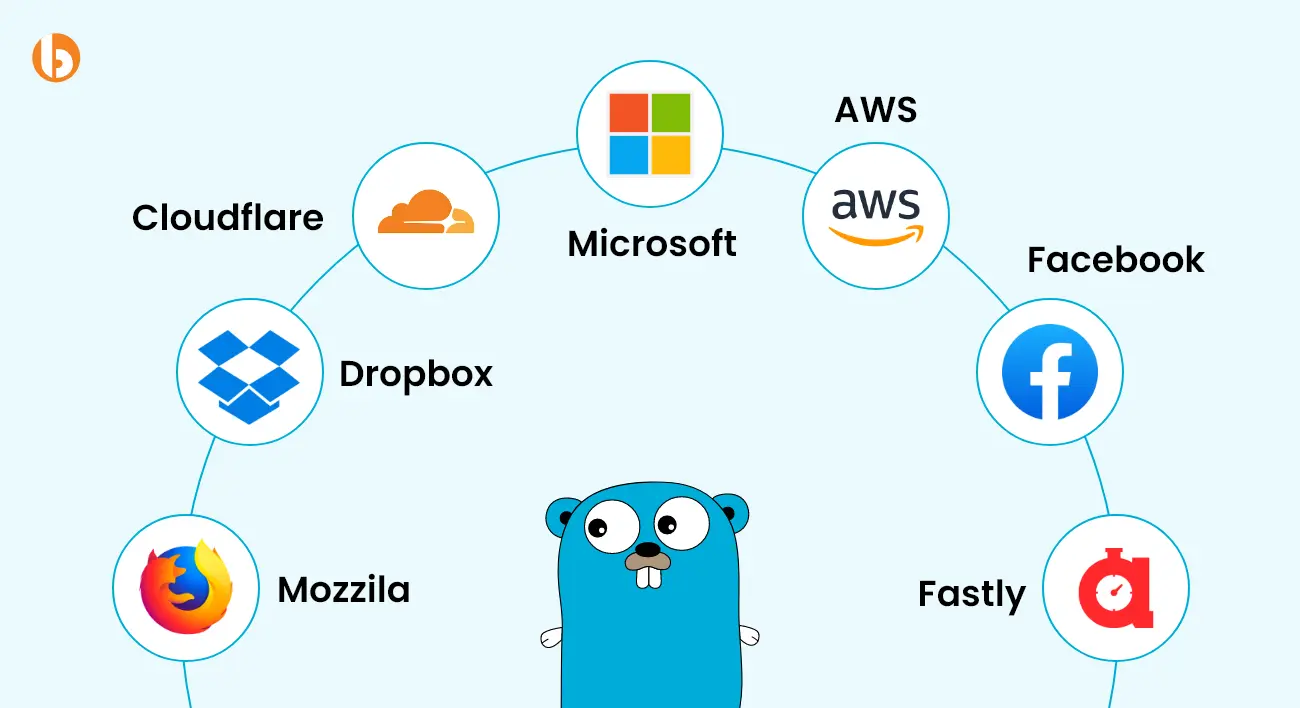
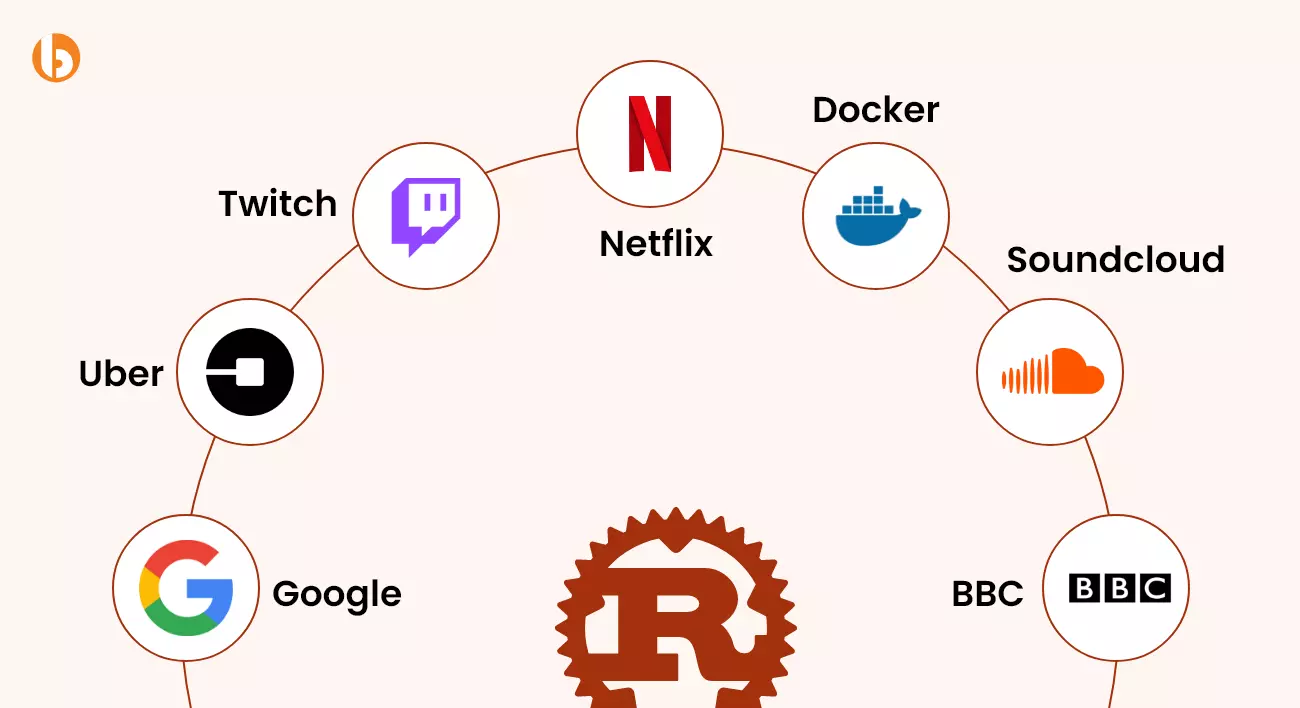
Conclusion
Though Golang and Rust have gained significance in the market within years, Golang seems to have the upper hand over Rust. However, the final choice between Golang vs Rust will depend on the specific needs of your project and its requirements. Suppose you are building a web application or a distributed system. Golang is the more feasible option due to its simplicity and scalability. Still, if you are building a security-critical application or a system-level program, Rust’s emphasis on safety and reliability may make it the better choice.
Regardless of which language you choose, both Go and Rust are powerful tools for building high-quality software to help you achieve your development goals. However, if you are also a business owner and are confused about which of the two is the ideal choice for your web application development Hire Software Development Company like Bacancy to help you with your development process and to guide you through the process which of the two would be the most feasible option for your project.
Frequently Asked Questions (FAQs)
Golang is more efficient in compilation time, but it lacks runtime speed. However, Rust, on the other hand, is effective in delivering output due to its runtime speed but is behind Golang in compilation time.
Rust can do an admirable job when you intend to develop web services. It offers libraries such as Serde and Diesel that help save time and effort. The type system makes modeling your business domain easier, which in turn, will prevent your service from going down.
Rust focuses on memory safety, control over memory layout, and zero-cost abstractions. It is well-suited for systems programming, such as writing low-level codes, operating systems, or embedded systems, making it a better choice for systems programming. However you can also use Golang for systems programming, but it is not as efficient as Rust.
Go has excellent support for networking and web protocols with its standard library packages like ‘net’ and ‘http’. Rust also has libraries and frameworks (e.g., Actix, Rocket) but may not have as mature an ecosystem as Golang.
Your Success Is Guaranteed !
We accelerate the release of digital product and guaranteed their success
We Use Slack, Jira & GitHub for Accurate Deployment and Effective Communication.

